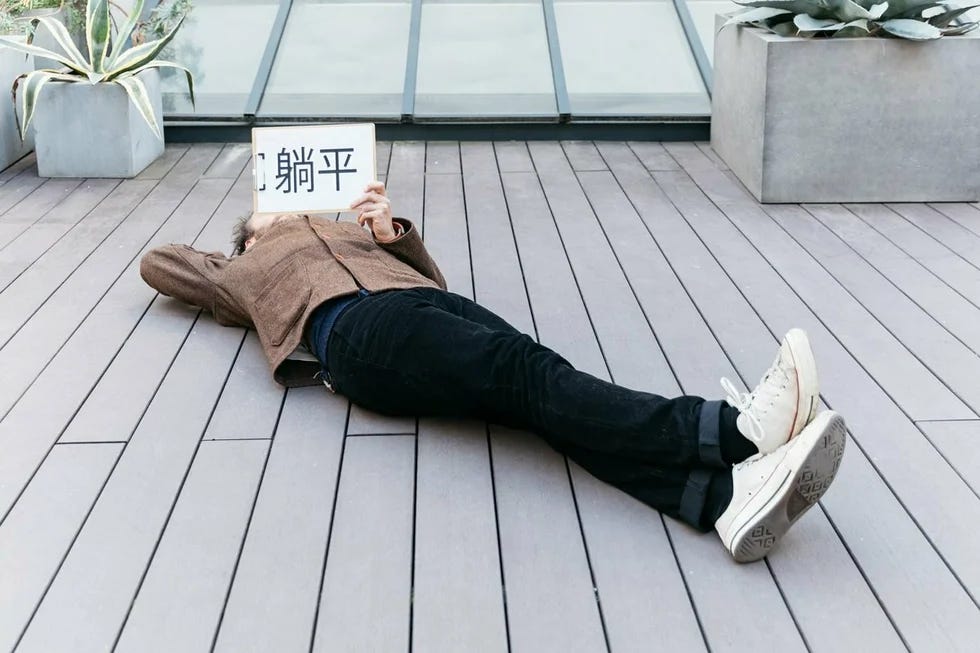Quiet Quitting Yoga
v.27 | And other aspirations.
Happy New Year, Yogafolk —
In 2023 I’m aspiring to un-do. To un-become. To release the harmful ways I’ve been socialized and trained to obey and abdicate, and then replicated those patterns. In many ways this has been happening society-wide for a few years now — in work places, yoga and spiritual communities, Hollywood, and in the home folks are recognizing that we can’t keep going as we were.
Philosopher Báyó Akómoláfé defines unbecoming as “a political invitation to unlearn ‘mastery,’ to fall to the Earth, to learn how to commune with soil.” Or in Restorative Yoga teacher Octavia Raheem’s words: “You are learning what is yours and what is not yours. You are shedding.”
How might we embody this shedding?
During the research phase of my dissertation, an interviewee led me to “tang ping,” a sociopolitical slogan and movement in China that translates to “lying flat.” Tang ping represents exhaustion with the status quo, and a refusal to conform to societal pressures. It is somatically expressed by assuming a simple horizontal posture.
“We need to dismantle all our unnecessary…vertical structures…our hierarchies, competitions, skyscrapers, thrones, missiles…we are exhausted from maintaining that [upright] stance. It is time that we lie down.”
— Marco Vassi, Lying Down: The Horizontal Worldview
Philosopher Michel Foucault envisions the body as culturally constructed, a prime player in the power dynamics and social relations of the world. It follows that posture is a bodily technique that conveys socially significant messages.

So while “lying flat” is cheeky, as a metaphor and bodily posture it is powerful. It is related to the term “quiet quitting,” which recently exploded on social media, and sent shockwaves through the labor world. But it isn’t a terribly new concept. It’s a philosophy of doing less than absolutely perfect. Zaid Khan says of quiet quitting: “You're still performing your duties, but you're no longer subscribing to the hustle culture mentality that work has to be your life. The reality is it's not — and your worth as a person is not defined by your labor."
Similarly, your spiritual worth is not defined by your āsana hustle.
The underlying ethos behind the āsana struggle is tapas — heat and discipline. Tapas is said to be purificatory, and alchemizing, transforming our bodies, minds, and spirits. As I understand it, tapas is one of the principal links tying our contemporary practices to ancient ones.
And yet, I think that there is the possibility of being burnt up with too much tapas. Absolutely, and totally dried out. Cooked. As Lea Perfetti notes in a heart-filled Ashtanga Dispatch pod, burnout doesn’t lead to ecstasy or enlightenment. It just leads to burnout.
“Spreading yourself too thin, both physically, mentally and emotionally will catch you…Women, please rest, eat, bask, sing, make love, laugh and play. Save some of you for later. Cherish the women around you, don’t rush your pregnancies, let your body grow, honor your breasts, talk to your womb, rest when you bleed, rest when you can, don’t push your body until it’s dry and brittle. Hold your self each day for a little bit. Tell your daughters, your granddaughters, tell your friends. Love, love, and love your self, because then all those around you will be well too.”
So instead of pushing, sweating, starving, striving, rushing, breaking, molding, and, shape-shifting, I advocate for “lying flat.” I argue that śavāsana, as the yogic practice of lying flat or quiet quitting, is a critical tactic of dismantling power structures, and of caring for oneself and community. So, friends, lay down. Bring the ethos of śavāsana into every pose. Or…allow the whole of practice to be śavāsana.

Whether we approach practice with more tenderness, and ease, or just push a little less, the fact that we do choose (to show up, to practice, to remain devoted and in reciprocity) is tapas enough. Balancing āsana with life rather than forcing it to be the entirety of life is, I think, part of the spiritual work.
Pranidhi Varshney writes:
“Perhaps the most radical and effective path forward is to be engaged in the process of yoga in real life. To come to our practice in a way that honors its roots and allows us to evolve…To cultivate a life that is full and to bring yoga into its appropriate place within that life. In this way, the practice of yoga becomes not our primary focus but our support system.”
In case you needed permission: you can quiet quit yoga. You can lie flat. You can integrate practice into your life in ways that are rich and fulfilling. And you can still be good enough. Maybe even enlightened.
Til next time,
Erica
Each week the Rubin museum produces a meditation session inspired by a work of art from their collection. In a session inspired by the Tibetan Wheel of Life, Sharon Salzberg guides us to renew, which she says is “absolutely essential.” The meditation itself begins around 12:30 if you’d like to skip straight to the juice. You can also see upcoming meditations here.

YearCompass is a free booklet that guides you to uncover patterns, and design a future year that you can embody and walk with ease. I loved completing it. Both reflecting back and looking forward brought insights, and tenderness.
“Practice is an essential reset button that we must push many times before we can experience any genuine newness. Whether we’re aware of it or not, we are practicing all the time. When we operate by our habituated patterns, we strengthen certain neural pathways, which makes us, as the saying goes, “set in our ways.” But when we stop using old neural grooves, these pathways actually die off! Practice can literally create new responses and allow rigid ones to show themselves.”
— Father Richard Rohr, The Importance of Practice
Headings and illustrations for Yogafolk are by Leah Tumerman and Chelsey Dyer.









